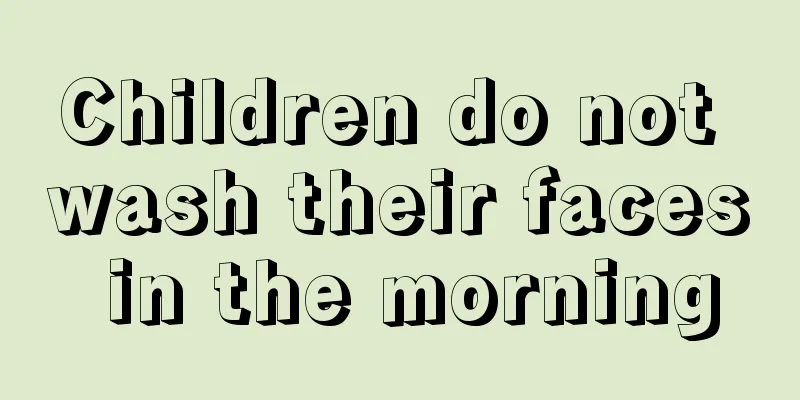Introduction to neonatal urine output

|
When a newborn baby comes into this world, parents all hope that their baby will grow up healthy and happy. Babies' various physiological problems have become a headache for first-time parents. Among them, the baby's urination problem is also one of the problems that many parents are entangled with. How many times should their children urinate every day? What should the amount be? What should the color be? (1) Frequency of urination: Babies begin to urinate soon after birth, but some may not start urinating until around 36 hours after birth. In the first few days after birth, due to low intake, the baby urinates only 4 or 5 times a day. After one week, the number of urinations suddenly increases to 20-25 times because the baby's metabolism is vigorous, the water intake is large and the bladder capacity is small. At the age of one year old, the baby urinates 15-16 times a day. Generally, children around one and a half years old can control their urination by themselves, and the time interval between urinations gradually lengthens to 6-7 times a day in preschool and school age. (ii) Daily urine volume: There are large individual differences in urine volume among children. The normal urine volume for a newborn in the first 48 hours after birth is generally 1-3 ml/kg per hour. <1.0 ml/kg per hour is oliguria, and <0.5 ml/kg per hour is anuria. The normal daily urine output of infants is 400-500 ml, that of toddlers is 500-600 ml, that of preschool children is 600-800 ml, and that of school-age children is 800-1400 ml. When the daily urine output of school-age children is less than 400 ml, that of preschool children is less than 300 ml, and that of infants and young children is less than 200 ml-200 ml, it is considered oliguria; when the daily urine output is less than 30-50 ml, it is considered anuria. (III) Nature of urine: 1. Urine color - The urine is dark and slightly turbid in the first few days after birth. After being left alone, reddish-brown precipitation occurs. This is urate crystals. The urine color becomes lighter after 2-3 days. Normal infant urine is light yellow and transparent, but salt crystals may precipitate out and the urine may become turbid if left in cold seasons. Urate can be dissolved by heating and phosphate can be dissolved by adding acid. 2. Acidity and alkalinity - In the first few days after birth, the urine is highly acidic due to the high content of urate. After that, it becomes close to neutral or weakly acidic, with a pH of 5-7. 3. Protein - Normal children's urine contains only trace amounts of protein. It is abnormal when the protein content is >200 mg/day. 4. Urine sediment examination - After normal fresh urine is centrifuged and precipitated, the sediment is examined under a microscope. The number of red blood cells is <3/HP, the number of white blood cells is <5/HP, and casts are generally not present. Do all the anxious parents understand now? In fact, the amount of urine a child excretes every day will vary depending on the amount of water and food they consume every day. If babies feel uncomfortable, they will cry incessantly. At this time, parents should pay attention to see if there is something wrong with their babies' bodies. |
<<: What is the best height for a newborn baby pillow?
>>: What to do if your baby can't sleep well
Recommend
What are the symptoms of Down syndrome newborns
I believe many people know that human beings are ...
What to do if a child has repeated fever due to pharyngitis
The treatment time for pharyngitis is relatively ...
Why does my child's buttocks itch?
Parents often hear their children say that their ...
When is the best time for baby's skin to fall off?
After birth, a newborn baby will experience sligh...
What happens if your child is zinc deficient?
Many people do not have a clear understanding of ...
Can children eat black fish?
Because children's stomachs and intestines ar...
What are the symptoms of hand, foot and mouth disease encephalitis?
Hand, foot and mouth disease is a common infectio...
18-month-old baby early education
For most people, teaching children should start f...
How can teenagers prevent hair loss?
Due to heavy schoolwork, teenagers now face no le...
What should I do if my child has tonsillitis and hoarseness?
What should you do if your child has tonsillitis ...
This emergency treatment will not leave scars on children after burns
Because people wear very thick clothes in winter,...
What to do if children cough at night
Babies have a relatively fragile constitution and...
What to do if the baby bleeds when squeezing his eyes
Babies' bodies are generally fragile and easi...
Why does my child frequently clear his throat?
Some children clear their throats frequently. Par...
What exactly is going on with my baby's cough and wheezing?
Many new mothers become very anxious when they fi...









